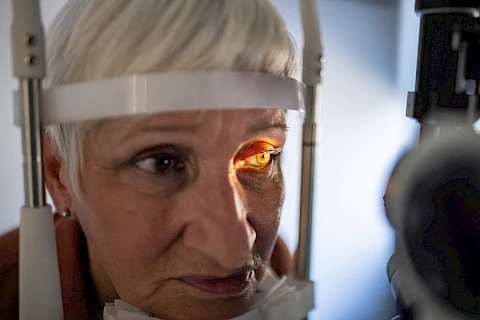
Cataracts are a common eye issue among seniors, often leading to cloudy or blurred vision. This condition can make daily activities challenging and affect the overall quality of life. However, with the right support from caregivers, managing cataracts can be less daunting. Senior Helpers will guide caregivers through the process, from recognizing symptoms to assisting with daily tasks and preparing for and recovering from surgery.
What Are Cataracts?
Cataracts occur when the lens of the eye becomes cloudy, leading to decreased vision. They develop slowly and can affect one or both eyes. Seniors are particularly at risk due to the natural aging process. Common symptoms include cloudy or blurred vision, difficulty with night vision, sensitivity to light and glare, and fading or yellowing of colours.
While aging is the most common cause of cataracts, other factors include diabetes, smoking, excessive alcohol use, prolonged exposure to sunlight, and a family history of cataracts.
Diagnosis and Early Detection
Regular eye exams are vital for early detection of cataracts. Catching cataracts early can lead to better management and treatment options. Eye doctors diagnose cataracts using a series of tests, including a visual acuity test and a slit-lamp examination. These tests are straightforward and typically painless.
Seniors and their caregivers should openly discuss any changes in vision with healthcare providers. Early detection can significantly impact the effectiveness of treatment.
Assisting with Daily Activities
Adapting the home environment can help with the management of cataracts. Bright, well-distributed lighting can help seniors see better. Use curtains and shades to minimize glare from windows. High-contrast colours can help distinguish objects around the home.
Ensure that walkways are free of obstacles to prevent falls and use assistive devices when necessary. Canes, walkers, and handrails can offer additional support and stability. Label items with large, clear text to make them easily identifiable. Help with tasks such as shaving and nail trimming to ensure safety and accuracy.
What to Know About Cataract Surgery
Cataract surgery involves removing the cloudy lens and replacing it with a clear artificial lens. It is usually done on an outpatient basis and has a high success rate. Pre-surgery ensures seniors follow the doctor's instructions, which may include stopping certain medications and fasting before surgery. Surgery can be daunting for seniors. Provide emotional support and reassurance, explaining the benefits of improved vision post-surgery.
After the surgery, use prescribed pain medication and avoid touching or rubbing the eye. Follow the doctor's instructions carefully to prevent infection and ensure proper healing. Attend all scheduled follow-up visits to monitor healing and avoid strenuous activities and bending over, as these can increase eye pressure. Watch for signs of complications such as increased redness, pain, or vision changes, and contact the doctor if they occur.
Discover Comprehensive Care and Support
Cataracts can significantly impact a senior's life, but with the right support, caregivers can make a big difference. From recognizing symptoms to helping with daily activities and supporting surgery preparation and recovery, every step counts. Remember, Senior Helpers is here to provide professional support. Contact us today for senior care services tailored to your needs.